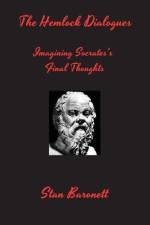von Stan Baronett
22,00 €
Since Socrates never wrote anything, Plato and Xenophon created their own versions of Socrates's conversations. Although their accounts may be close to what actually occurred, nevertheless, this allowed them to create their own interpretations of what Socrates said and meant. It has been said that Plato showed us the philosophical Socrates, and Xenophon showed us the practical Socrates. Both writers created extensive dialogues, often using the same setting, in which Socrates poses or answers questions. The intent of the new book, The Hemlock Dialogues, is to rework some of Plato's and Xenophon's dialogues in order to have Socrates meet in the middle; to have the philosophical and practical Socrates mesh into the simple life of an honest man. All the passages in this book are the result of rewriting some of Benjamin Jowett's translations of Plato's works, and some of Henry Graham Dakyns's translations of Xenophon's works. For example, a passage may include part of Plato's account of a particular dialogue and part of Xenophon's account. Plato and Xenophon drew on their memories of encounters with Socrates as they reconstructed their dialogues. It is normal to experience memories flashing through our minds, often darting from one thing to another with no apparent connection. And, we are told, our memories are not perfect copies of what occurred. In fact, each time we recall a memory it gets changed, perhaps not by much, but even a minor change affects the content of the memory. Given this, we can expect Plato's and Xenophon's reconstructions of Socrates's conversations, especially long discussions, to be subject to, at the very least, innocent changes. The Hemlock Dialogues offers a reinterpretation of some of Socrates's conversations. Charting a new path through Plato's and Xenophon's dialogues creates a new landscape in which to explore some of Socrates's most important conversations. It seems likely that when Socrates reminisced about his past, he also drew on memories that had changed over time. We can imagine Socrates's final reveries blazing through his mind, flitting from one setting to another as he neared death.




